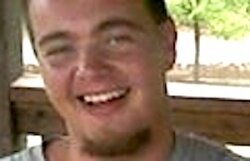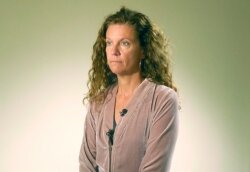Self-defense: Cop cleared in Afton shooting
The officer who fired five bullets and killed 21-year-old Greg Rosson had "reasonable fear of death or serious bodily injury" and will not face criminal charges, according to a determination released August 23 by Albemarle Commonwealth's Attorney Denise Lunsford.
That assessment doesn't sit well with Rosson's family. "I don't see how you shoot someone five times and it's justified," says his mother Denise Rosson.
The six-page report details the events of June 8, when Rosson's mother called 911 at 2:16am after being contacted by his girlfriend. Denise Rosson said the girlfriend screamed and the phone went dead. When she called back, her son answered the girlfriend's phone, said he was choking the woman and that his mother would be next, according to Lunsford's report.
Officer Jim Larkin, who's been with Albemarle County Police for 10 years, was at a traffic stop in Old Trail in Crozet and closest to the scene. He headed west to 9049 Rockfish Gap Turnpike, stopped just down the road at the Rockfish Gap Country Store to get his rifle out of the trunk, and then pulled into the driveway at 2:30am.
En route, Larkin was advised by the Emergency Communications Center that the caller was unsure whether Rosson had a weapon. A dispatcher also told him that Rosson had a rifle in his truck in a recent encounter with Albemarle police, and that just a few days before, on June 3, another county officer requested backup because Rosson had gotten hostile with officers on the previous night, according to the prosecutor's report.
Rosson had a major confrontation with police at a Greenwood gas station December 9 and was charged with four counts of assaulting an officer, one of trying to disarm an officer with a stun gun, obstruction of justice, disorderly conduct, and drunk in public. He was scheduled to be in court on two of those charges June 11.
Within 30 seconds of pulling into the driveway, Larkin had fired his weapon.
According to the narrative of events, when Larkin arrived, he saw feet on the ground behind an SUV, and it appeared the person was being pulled or was dragging himself or herself behind the vehicle. Larkin radioed ECC at 02:30:56 that a person was on the ground, and he exited his patrol car with flashlight in hand and his gun drawn.
Larkin could hear a woman's voice behind the SUV and believed she was in distress, he told investigators. As he moved toward the rear of the SUV, he saw that Rosson had the woman in a chokehold. Larkin identified himself as a police officer and commanded Rosson to stop. Instead, according to the report, Rosson punched the woman several times, "suddenly got to his feet and, without hesitation, charged at Larkin," who was at the front driver's side of the SUV while Rosson was at the rear.
Believing Rosson intended to kill him, "Larkin fired until Rosson fell," says the report, aiming high to avoid hitting the woman on the ground. He reloaded, and called ECC at 02:31:25 to say shots were fired and to request an ambulance.
At that point, Larkin, still the only officer on the scene, took cover behind a tree and advised the woman, who appeared partially clothed and injured, to remain where she was. At 02:33:51, he requested an additional ambulance.
Six minutes after Larkin fired, Officer Turner Lowery arrived, immediately followed by Detective Jeremy Lavin at 02:38:33. Lavin began CPR on Rosson and continued until emergency medical technicians arrived at 2:44am. Rosson died at the scene, says Lunsford's report.
The autopsy determined that Rosson had six gunshot wounds and five bullets were recovered from his body. A wound to the neck had both entrance and exit wounds and is believed to have entered his chest at the left clavicle. Two of the shots were fatal, injuring his heart, esophagus, and lungs, and he died from significant loss of blood, according to the autopsy, which also noted his blood alcohol content was .17 or .18 at his time of death. The legal limit at which one can be convicted for driving under the influence in Virginia is .08.
Calling the events "tragic," Lunsford says her job was to make the determination whether the officer violated the law. "I determined the officer should not be charged because he reasonably feared for his life and for the woman's," she says.
Rosson's sister, Lauren Moore, says she learned that no charges would be filed in her brother's death when a television reporter called her, and she calls the decision "bullsh*t."
She also has questions that weren't answered: Why did Larkin respond to a domestic disturbance alone, and "why didn't he try to give Greg CPR?"
According to Albemarle County Police Sergeant Darryl Byers, there are no official guidelines on providing medical treatment and that officers must consider their own well being.
"As long as a situation seems safe enough to render assistance," he says, "it's okay to do so."
Rosson's sister also wonders why the ECC database didn't reveal that Rosson had mental health issues. According to Moore, after Rosson was arrested in December and in jail, he was diagnosed with dissociative identity disorder.
Denise Rosson says she told the 911 dispatcher that Greg Rosson had a mental condition, and that when his "alter personality" was out, he was mean. "I told them his alter was out," she said in an August 16 interview. "I could tell that was his alter."
Lunsford points out how quickly the officer had to make a decision when he believed the woman's life and his own were in danger. While mental health issues should be taken into consideration, she says that when a larger person charges and doesn't stop when ordered, "everyone has a right to defend themselves." And the victim told investigators that night that Larkin had saved her life.
The victim declined the Hook's request for an interview.
"I can't imagine what the Rosson family is going through, or the woman, or what the officer is going through," says Lunsford. "It was a very tragic situation. It was tragic for everyone. No one walks away clean."
Albemarle police Chief Steve Sellers says he was relieved the report came back the way it did absolving Officer Larkin of any wrongdoing. "Police shootings are tragic in any event," he says. "Our hearts and prayers go out to the original victim, our hearts and prayers go out to the Rosson family."
Seventy-five percent of the Albemarle County Police Department officers have crisis intervention training, including Larkin, says Sellers. But sometimes, there simply isn't enough time to call in a crisis intervention team. When questioned about using methods other than deadly force in the Rosson case, he says, "Most of my officers don't have Tasers. Officer Larkin didn't."
He also notes that for officers on the midnight shift covering Albemarle's 700-plus square miles, particularly in the rural areas, on average their backup is 12 minutes away.
Colonel Sellers says he thinks Larkin responded in the best way he could respond. "I think he saved a woman's life. I think he saved his own life. We could have had three people dead."
Officer Larkin has been on restricted duty for a few months, says Sellers, and still has to go through the "very painful" administrative investigation debriefing process. Part of that process, says Sellers, is looking as "what could we do differently, what should we do differently."
While police shootings are rare in Albemarle, Sellers acknowledges that the fatal shooting has led to greater scrutiny of county police, particularly in the wake of two other recent shootings by his officers, and he says the department is making a greater effort to train officers.
"Don't be afraid of police," he urges. 'We're there to help. This is a tragic situation."
For officers involved in fatal shootings, says Sellers, "We're all human beings. We bleed. We cry. We hurt. In situations where we take a life, it leaves a scar."
He adds, "It's very personal."
It's very personal for Rosson's mother and sister, as well.
Denise Rosson describes her son's relationship with the victim as "dysfunctional," and says that woman was involved in the December gas station brawl. She points out that it took six cops to arrest her son then. "And you know what? They didn't kill him," she says. "No shots were fired."
In contrast, she questions one officer responding to a domestic disturbance alone. "Twenty-nine seconds after you arrive, my son is dead and you're going to wait seven minutes before you do anything?" asks Denise Rosson.
The grief-stricken mother suggests more compassion to the families of people killed in police encounters. For example, she says she didn't find out charges weren't going to be filed against the officer until a reporter called.
And she says she went to the scene on June 8 and saw her son lying dead. "They sent me away like I was a nobody," recalls the mother. "They took my name and number. They couldn't tell me for nine hours whether my kid was alive or dead. I guess they felt like his life was worthless."
Denise Rosson wants people to know that "Greg wasn't the monster people made him out to be. He was my baby," she says. "You'll never justify killing him like an animal."


1 comment
So I wonder if the mother had shown up with a gun and he came at her and she laid him out would she be upset if she was charged with murder?
It looks like the Officer did what was nessasary. Whether it took one shot or twelve doesn't matter. All that matters is that he stopped a felony assault in progress from a known violent offender who took six cops to wrestle a few weeks before.
If I was the neighbor and knew the reputation of this poor soul I would have come over with my weapon locked an loaded prepared to do whatever it took.
The only legitmate complaint I see is that the family should have been hand deliverd a copy of the findings before the press.